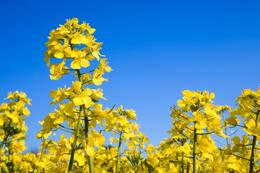
Couldn't have happened to a seedier bunch of people, either.
A genetically modified (GM) crop has been found thriving in the wild for the first time in the United States. Transgenic canola is growing freely in parts of North Dakota, researchers told the Ecological Society of America conference in Pittsburgh, Pennsylvania, today.
The scientists behind the discovery say this highlights a lack of proper monitoring and control of GM crops in the United States.
US farmers have dramatically increased their use of GM crops since the plants were introduced in the early 1990s. Last year, nearly half the world's transgenic crops were grown in US soil — Brazil, the world's second heaviest user, grew just 16%. GM crops have broken free from cultivated land in several countries, including Canada, the United Kingdom and Japan, but they have not previously been found in uncultivated land in the United States.
"The extent of the escape is unprecedented," says Cynthia Sagers, an ecologist at the University of Arkansas in Fayetteville, who led the research team that found the canola (Brassica napus, also known as rapeseed).
Sagers and her team found two varieties of transgenic canola in the wild — one modified to be resistant to Monsanto's Roundup herbicide (glyphosate), and one resistant to Bayer Crop Science's Liberty herbicide (gluphosinate). They also found some plants that were resistant to both herbicides, showing that the different GM plants had bred to produce a plant with a new trait that did not exist anywhere else...
Like all of Monsanto's genetically manipulated crops, these were originally designed (and rigorously certified) to be sterile. You see, Monsanto doesn't want farmers to grow their own seed. It's simply that out of billions of seeds planted, a certain percentage mutagenizes and recombines things out there in the broad relentless radiation of the sun.
Me, I was hoping for an alarm about velociraptors on Wall Street, and. let's face it, pretty much all of popular culture
 , but canola that laughs at Round-Up and spreads its resistance around to other angiosperms is by far the lesser of two evils.
, but canola that laughs at Round-Up and spreads its resistance around to other angiosperms is by far the lesser of two evils.Not that they'll learn from it.

No comments:
Post a Comment